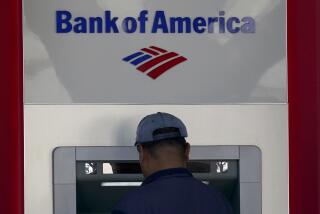Seized Bank of New England Reopens : Bailout: It’s mainly business as usual while federal authorities seek buyers for the bank and its affiliates.
- Share via
BOSTON — The Bank of New England opened its doors under federal control today with business as usual, while authorities sought buyers for the bank and its two affiliates.
Only about a dozen people lined up outside a Bank of New England branch in downtown Boston before it opened this morning. One person, Northeastern University student Keith Hartman, withdrew the $3,000 he had in the bank.
“I was just worried about it getting tied up,” he said. “I’m just not taking any chances.”
Some nervous depositors at other branches were also withdrawing money, but others said they weren’t worried because they had faith that the federal government will back their deposits.
There were only two people in line at another downtown office today, with no signs of concern about the company’s problems.
“I’m definitely taking most of my money out, but I will leave about a quarter here just to keep my accounts open. I haven’t totally lost confidence in the bank yet,” one customer said.
The Bank of New England was a victim of its own aggressive growth during the Northeast’s boom real estate market of the early 1980s, analysts said. When that market went bust, borrowers defaulted on loans.
Late Sunday, L. William Seidman, chairman of the Federal Deposit Insurance Corp., announced the takeover of Bank of New England Corp., the region’s third-largest bank holding company. He said the FDIC will pump $750 million into the company’s three subsidiary banks and negotiate to sell them.
The immediate effect on customers is expected to be small because the bailout replenishes the banks’ capital and lets them operate in a business-as-usual fashion.
Seidman put the cost of the bailout at $2.3 billion.
The money will come from the FDIC’s Bank Insurance Fund, which contains about $14 billion contributed by the nation’s commercial banks and insures an estimated $2 trillion in bank deposits. None of the money will come directly from taxpayers, regulators said.
Regulators said there had been two bidders to take over the troubled bank. They would not disclose those bidders, but the Boston Globe quoted sources as identifying them as Banc One Corp. of Columbus, Ohio, and Wells Fargo & Co. of San Francisco. It also said Fleet-Norstar Inc. of Providence, R.I., had expressed interest.
Consolidation may bring additional layoffs to a state already suffering from 7.4% unemployment, the highest in 11 years.
More to Read
Sign up for Essential California
The most important California stories and recommendations in your inbox every morning.
You may occasionally receive promotional content from the Los Angeles Times.













